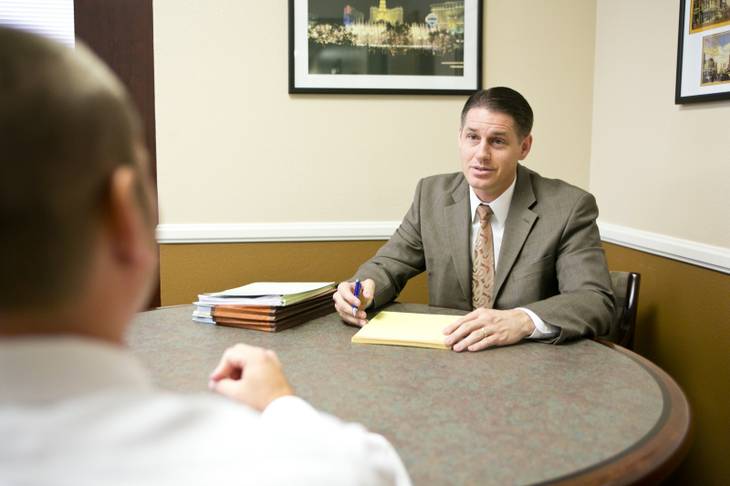What not to do when picking a lawyer
Never choose a lawyer based on television advertising.
“The ‘Bulldog’ and the ‘Strongarm’ might be great if you are looking to hire a professional wrestler or a repo man, but they tend not to impress a judge,” according to Legal Law Help, an online legal resource guide for consumers. “The only sure thing you are getting for your money from these lawyers is bad acting – another thing that usually doesn’t go over too well in court.”
Never hire a lawyer based on an ad in the telephone book.
“The flashy phone book ads have about zero correlation with quality lawyering,” Legal Law Help advises. “There are simply much better ways to go about finding a good lawyer than random chance based upon what catches your eye in the phone book.”
What to do if acting as your own attorney
There’s an old adage that says, “An individual who represents himself in court has a fool for a client.”
While it is legal to represent yourself in a court case, under most circumstances, it’s a bad idea.
But if you are going to take the plunge, there are several tips to keep in mind:
• Judges and court personnel aren’t allowed to give legal advice. People who represent themselves in court must be aware of all court procedures, filing requirements and deadlines. They will be held to the same standard as attorneys.
• Court staff isn’t allowed to fill out forms for you.
• Direct contact with a judge isn’t allowed.
• Case numbers must be placed on all documents filed in court. A case number is essential to check the status of a case.
• A copy of anything filed with the court must be provided to the other side. Always note at the bottom of filings when and how the copy was provided.
• People representing themselves must cooperate with the other side to set hearings and trial dates.
• Dress appropriately and be polite. Wait until it’s your turn to speak. Address the judge as “your honor” and stand when he or she enters the courtroom.
Of course, there are alternatives to a formal court hearing.
For civil matters involving less than $7,500, people can file small claims cases in the Las Vegas Township Justice Court.
There also are mediation and arbitration services available in Southern Nevada. Using a mediator to resolve a dispute can be a less expensive, less intrusive process and is particularly good for cases with embarrassing elements to them. Because disputes aren’t heard in courtrooms, there are no public records in a mediation. Arguments can be aired behind closed doors.
Mediators and arbitrators are typically attorneys or retired judges and can be found online or in the monthly Nevada Lawyer magazine published by the State Bar of Nevada.
With apologies to Glen Lerner, Ed Bernstein, Adam Kutner and the other attorneys who try to impress with television personas, contracting legal help based on what you see on TV is a bad way of finding someone to represent you and your business when you have a legal dispute.
Besides, most of the guys on TV work in personal injury and divorce cases — not exactly the kind of legal work most businesses need.
But in these litigious times, it’s more likely than not at some point a business will have to defend itself in a civil proceeding or take action to reclaim damages. In those cases, you’ll need to find a lawyer.
How do you find the best person for the job?
“There actually are a lot of different ways to find the right one,” said Barbara Buckley, executive director of the Legal Aid Center of Southern Nevada. “But the most important thing is to do the research.”

Barbara Buckley
That research should include a review of lawyers’ credentials, including their schooling, standing with the bar association and case history.
“Many of the TV ads have lawyers making claims about how amazingly great they are, how tough they are and how they’re going to fight for you,” Buckley said. “That’s great, but that’s an advertisement.”
Potential clients first should pinpoint the specific type of lawyer they need. Most attorneys have legal specialties, and businesses should seek the type of lawyer best qualified to do the work they need. You wouldn’t, for example, want to hire a personal injury attorney to handle a contract dispute.
Then it’s time to find attorneys who specialize in that area. A computer search, particularly at the Clark County Bar Association website, can narrow the field.
“Once you have that list of prospective attorneys, the real research begins,” Buckley said. “Most firms are online, and some firms’ websites are really helpful in this area.”
Buckley said most firms post biographies of their lawyers. Some describe the types of cases they’ve handled, what pro bono work they’ve done and what they’ve accomplished.
“Some firms even publish their annual reports online,” Buckley said. “Some of them are really impressive products listing their recent case successes and all their qualifications by the area of law they practice.”
Buckley suggests seeking as much information about a prospective lawyer as possible. She suggests conducting a Google search to find published information that may not necessarily appear on the firm’s website.
Word of mouth also is a powerful tool.
“Getting firsthand knowledge from a friend, family or a business associate is probably the best way to make a good choice,” said John Aldrich, of the Aldrich Law Firm in Las Vegas. “Probably the No. 1 complaint people have with lawyers is that they aren’t good at getting back to the client. But if you talk to someone who refers you, they may say something like, ‘I’ve worked with John. John always calls me back.’”
And while Aldrich conceded that TV ads aren’t the only way to find a lawyer, he said they can be a tool for prospective clients. A lawyer who advertises on TV is at least successful enough to afford the cost of that advertising, Aldrich said. He should know. He has run a few television ads himself.
As the winnowing process continues, Buckley said it’s a good idea to start thinking about cost. She recommended against targeting attorneys on the high end or low end of the price spectrum.
“My best advice is to find someone who is honest that you can work with,” she said.
Communication is key and having an attorney who will walk a client through the legal process is a necessity, Aldrich added.
“Not only should they talk about the potential benefits of winning the case, but about the headaches of litigation,” Aldrich said. “You need to make sure you have an attorney who understands the issues. And it really helps if you have someone who can get along with the other side.”
Once the field is narrowed, it’s time to make contact with the attorney’s office. The best initial interviews are ones that are well organized, on both the lawyer’s and the client’s part.
Be professional, courteous and kind. Consider writing a summary of the legal issues that make up your case. The county Bar Association recommends taking a list of questions to the initial meeting.
Also, be sure to understand whether that first consultation will be billed.
The lawyer’s fees should be a big part of the conversation at the first meeting. Among the questions to ask: How do you charge for a case like mine? What charges are included in the fee? What charges are excluded? Is there a retainer? If so, how much?
Legal experts also advise asking about the attorney’s caseload and how long it should take to resolve a matter.
“The initial contact may also be a good time to talk about an attorney’s legal philosophy about resolving the issue,” Buckley said. “It’s good to ask how many cases have gone to trial and how many have been settled. Ask if they bring in another attorney if it does go to trial.”
It’s also a good idea to call the State Bar Association of Nevada to find out whether the attorney or firm have had any disciplinary actions brought against them.
Once you have chosen the lawyer you want, your job isn’t finished. Both sides have responsibilities.
An attorney should be enthusiastic and competent in handling the case. His or her office should provide copies of all important documents, a written fee agreement and detailed billing statements. The attorney should have a complete understanding of the client’s objectives and agree with the goals. Of course, the attorney should have no conflicts of interest.
Staff should treat you with respect, keep you fully informed and return your calls. The attorney also should provide you with the whole truth — even if it hurts to hear.
As a client, you should provide the attorney with any information you have about your case and be completely honest about all facts, whether the information is favorable to you or not. Ask questions when you don’t understand, and speak up if you disagree. Follow agreed-upon advice.
Be on time to appointments and cancel or reschedule if something comes up. Notify the attorney about any changes in the case, and keep the attorney informed.
Most importantly, if you really want a happy and effective lawyer, pay your bills on time.
